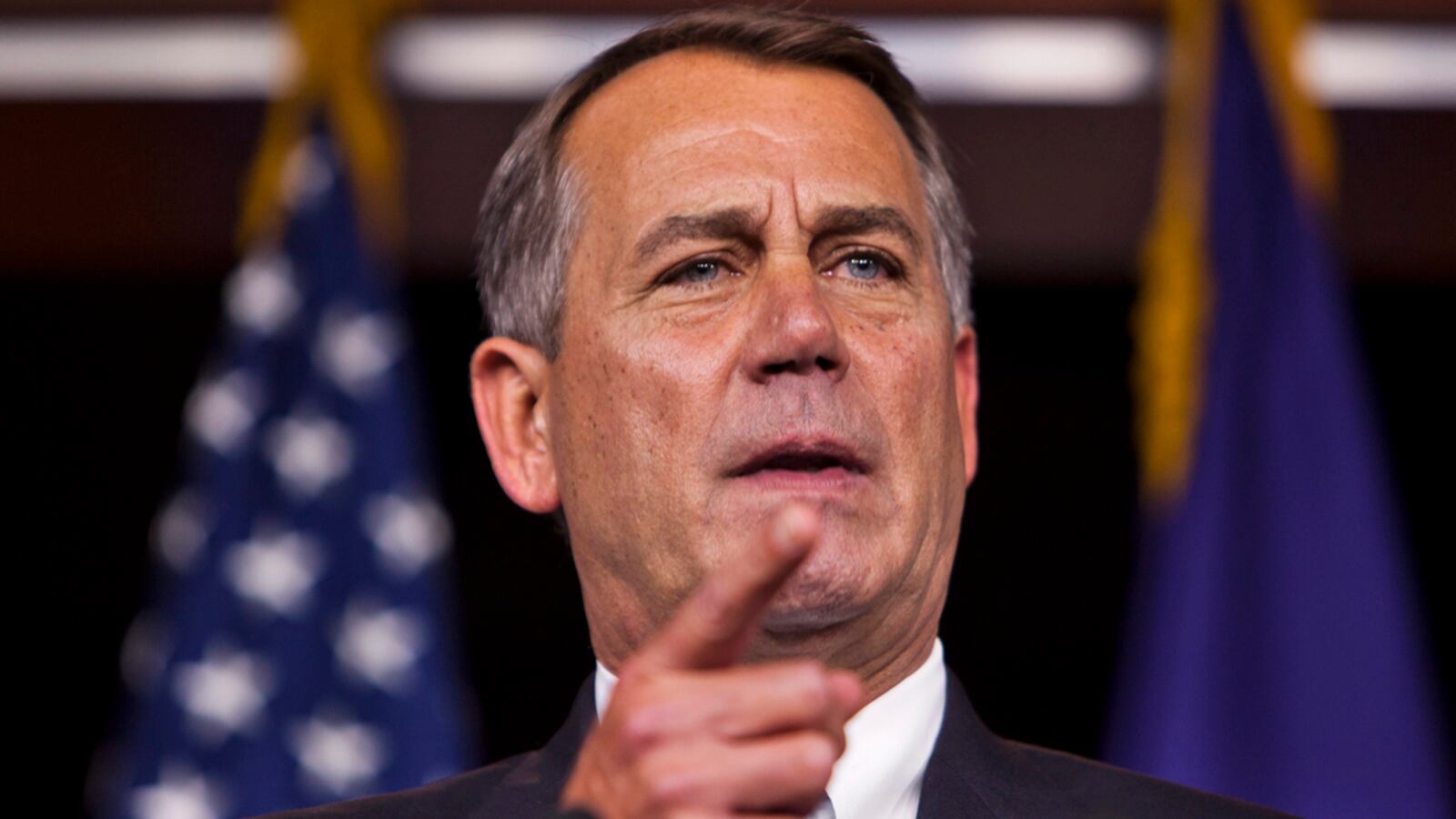Don’t worry about the House’s failure to vote on John Boehner’s debt plan Thursday night. That’s Boehner’s problem, not the country’s. True, I suppose we should devote a moment to reflecting on how terrible it’s gotten when a speaker with a lifetime rating from the American Conservative Union of 94 can’t pass a bill in his own party because he and it are “too left wing.” But if anything, a defeat for Boehner, today or whenever, would increase the likelihood that Mitch McConnell would have to play ball with Harry Reid and let Reid’s proposal serve as the framework for a deal, so a Boehner defeat would be fine.
What this will come down to is the same question it was always going to come down to: How many Republicans in the House of Representatives are willing to take the country down in their desire to see Obama defeated?
That’s the only important question here, politically speaking. The Senate is probably capable of working something out, since it’s in Democratic hands. GOP leader Mitch McConnell is an obstructionist and self-avowed Obama hater, but he’s probably not out there in Tea Party land. The question is and always has been about the House.
Let’s say some compromise bill, like the one my colleague Daniel Stone described yesterday, or some Reid-Boehner hybrid if Boehner’s bill does pass. Most Democrats in the House would back it. Not all—for example, the Congressional Black Caucus has announced that its members will support only a “clean” debt-ceiling bill and will oppose even Reid’s plan. That’s 40 people. Then there’s the more left-leaning progressives who detest this whole business—maybe another 30 or so. I don’t think all 70 of these people will end up voting to block a deal (and dramatically increase the likelihood of Barack Obama being a one-term president). But let’s say 25 to 30 are so mad that they actually do. That makes 165 or so Democratic votes for a compromise (exact number of Democrats in the House equals 193).

That would mean Boehner will need around 50 Republicans to agree to a compromise. Well? That’s only 21 percent of his caucus. But now we must apply a little game theory. The Republican Party usually doesn’t operate this way. Republican leaders don’t endorse bills for passage unless they have a majority of their own party. Letting 50 Republicans scamper off to cast a “pro-Obama vote” would violate this tenet. The 50 likely-votes would be targeted by the right and face howling pressure. That’s probably already started. Who is going to be the first Republican under these circumstances to announce that he’s pro-compromise? The second, the 10th, the 15th? This is the downside of the Boehner failure: those few Republicans inclined toward compromise will be terrified of the right. And don’t forget—the fact that any such compromise would have broad Democratic support ensures that the right-wing media will be fulminating against this “Democratic bill” and accusing Republicans willing to back it of treason.
The whole business is sickening. Let’s step back here. Since Ronald Regan’s presidency, Congress has voted to raise the debt limit 43 times:
Reagan, 18 increases Bush Sr., 9 increases Clinton, 6 increases Bush Jr., 7 increases Obama, 3 increases
Add ’em up. And note by the way that Republican presidents have required far more of these socialistic maneuverings than Democrats have—especially Reagan, who blew the original hole in our budget and made all this possible. (To see a list, click here, which takes you to a page of government charts, and then click on Table 7.3, which lists them all).
So, 43 times, and never—never—has an opposition party tried to do anything like this. The opposition party always raises a stink. Yes, there was that time in 2006 when Senator Obama voted against raising the ceiling. But that was very different from this. In 2006, the Senate Democrats voted en bloc against increasing the ceiling, but they were in the minority, and they knew all the Republicans would vote for it, so their vote was merely symbolic. They just wanted to make all the Republicans go on record supporting more debt.
There have been times when the opposition party—yes, sometimes Democrats—was ground in enough that the president’s party had to use some legislative trickery: attach the debt increase to another, more palatable bill, say. And then there’s the “Gephardt Rule” of 1980 that allows the House to send a joint resolution to the Senate, thereby avoiding a separate debt-ceiling vote (yes, the Republicans could have invoked this now but chose not to).
So the debt vote is always a political football. But it’s never been this. Ever. Obama could have spent four months pointing this history out to the American people. Instead, when the GOP put its gun to the hostage’s head, he said, “okay, how much do you want?” This is why we’re here. And while we may get out, it will be by one or two votes cast by Republicans who can kiss their careers goodbye. And the next fight will be even worse.






